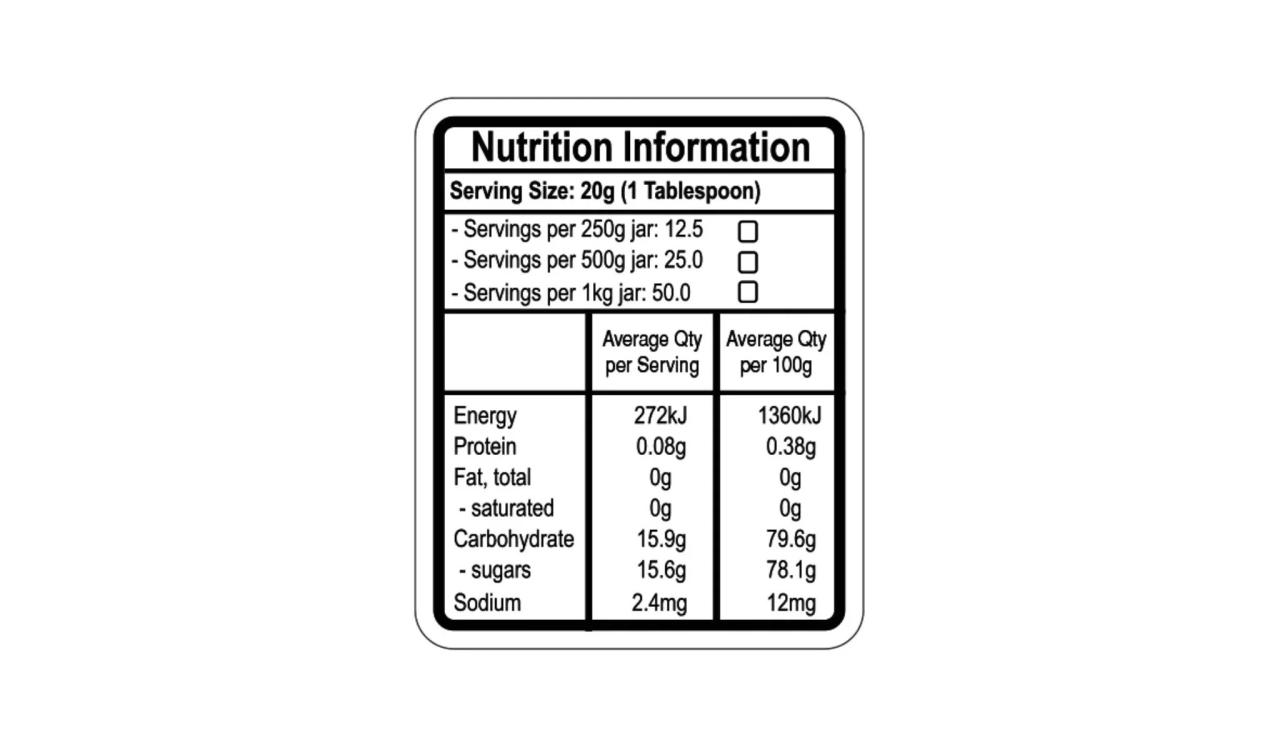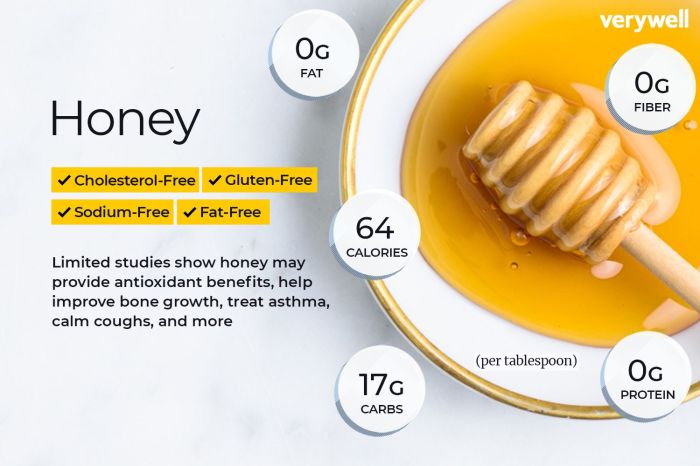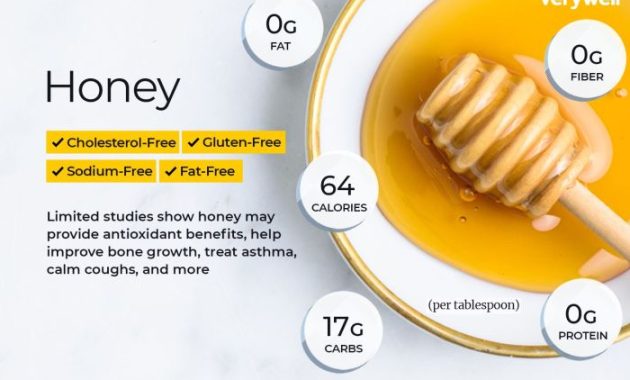Synergistic Effects of Honey and Lemon: Honey-lemon Nutrition Facts

Honey-lemon nutrition facts – The combination of honey and lemon offers more than the sum of its parts. While both individually possess notable health benefits, their synergistic interaction enhances their respective properties, leading to a potentially amplified impact on overall well-being. This synergy stems from the complementary actions of their bioactive compounds, creating a potent natural remedy.The antioxidant power of honey and lemon is significantly amplified when combined.
Honey contains various phenolic compounds and flavonoids, acting as potent free radical scavengers. Similarly, lemon is rich in Vitamin C and other antioxidants. These antioxidants work in concert; the different types of antioxidants present in each ingredient target different free radicals, providing broader protection against oxidative stress than either substance could achieve alone. This combined antioxidant effect contributes to reduced cellular damage and improved overall health.
Enhanced Antioxidant Capacity
The interaction between the antioxidants in honey and lemon isn’t simply additive; it’s synergistic. Studies have shown that combining certain antioxidants can lead to a greater overall antioxidant capacity than the sum of their individual capacities. This is because different antioxidants can work together to neutralize a wider range of free radicals more effectively. For instance, the Vitamin C in lemon can regenerate other antioxidants, extending their lifespan and enhancing their protective effects.
Honey-lemon’s nutritional benefits are well-known, offering a boost of vitamins and antioxidants. For a different healthy fat profile, consider exploring the avocado oil nutrition facts , which provides monounsaturated fats. Returning to honey-lemon, remember its soothing qualities are a perfect complement to a balanced diet.
This collaborative action significantly boosts the overall antioxidant defense system within the body.
Immune System Modulation
The combined effects of honey and lemon positively impact immune function. Honey’s antibacterial and antiviral properties, attributed to its hydrogen peroxide content and other bioactive compounds, are well-documented. Lemon, rich in Vitamin C, is crucial for immune cell function and production. The combined intake of these substances can potentially provide a more robust defense against pathogens. This effect is particularly relevant during periods of illness or when the immune system is compromised, potentially reducing the duration and severity of infections.
For example, a warm drink of honey and lemon might provide soothing relief from a sore throat and offer support to the body’s natural healing process. However, it is important to note that this is not a substitute for medical treatment for serious infections.
Honey-Lemon Consumption and Health Conditions

Honey and lemon, while individually beneficial, can present nuanced effects when consumed together, particularly for individuals with pre-existing health conditions or those on certain medications. Understanding these potential interactions is crucial for safe and effective utilization of this popular combination. This section will explore the impact of honey-lemon consumption on specific health conditions and potential drug interactions.
Honey-Lemon and Diabetes
The glycemic index (GI) of honey varies depending on its floral source and processing, but it generally ranks higher than many other sweeteners. Consuming honey-lemon in large quantities could lead to a rapid increase in blood glucose levels, potentially problematic for individuals managing diabetes. Lemon, while low in carbohydrates, does not negate the impact of honey’s sugar content.
- Individuals with diabetes should consume honey-lemon in moderation and monitor their blood glucose levels carefully after consumption.
- The combination should be integrated into a balanced diabetic diet, considering the overall carbohydrate intake.
- Consulting a doctor or registered dietitian is advisable to determine appropriate consumption levels based on individual needs and medication.
Honey-Lemon and Allergies
Both honey and lemon can trigger allergic reactions in susceptible individuals. Honey, containing pollen, can cause allergic reactions in those with pollen allergies, ranging from mild symptoms like skin rashes to severe anaphylaxis. Similarly, lemon allergies, though less common, can manifest as oral allergy syndrome or more generalized allergic reactions.
- Individuals with known allergies to honey, pollen, or citrus fruits should exercise caution and potentially avoid honey-lemon consumption entirely.
- Starting with a small quantity and monitoring for any allergic reactions is recommended if there is uncertainty about potential sensitivities.
- Seeking medical attention immediately if symptoms such as hives, swelling, or difficulty breathing occur is crucial.
Drug Interactions with Honey-Lemon, Honey-lemon nutrition facts
While honey-lemon is generally considered safe, potential interactions with certain medications exist. Honey’s high fructose content can affect the absorption and metabolism of some drugs, while the acidity of lemon can interact with specific medications affecting the stomach’s pH.
- Individuals taking medications that are sensitive to changes in stomach pH should consult their physician before incorporating large quantities of honey-lemon into their diet.
- Some medications might interact negatively with honey’s effect on blood glucose levels, especially in individuals with diabetes.
- It’s crucial to always disclose all supplements and dietary changes to your doctor or pharmacist, especially when on medication.
Risks of Excessive Honey-Lemon Consumption
Excessive consumption of honey-lemon, while unlikely to cause immediate severe harm in most healthy individuals, can lead to several negative consequences.
- High sugar intake from honey can contribute to weight gain, tooth decay, and increased risk of developing type 2 diabetes.
- The acidity of lemon can erode tooth enamel with prolonged or frequent exposure, potentially leading to dental problems.
- Excessive consumption can cause gastrointestinal discomfort such as heartburn or acid reflux in some individuals.
Query Resolution
Can honey-lemon help with a sore throat?
The soothing properties of honey and the vitamin C in lemon may offer some relief from sore throat symptoms, but it’s not a cure.
Is honey-lemon suitable for weight loss?
While honey provides energy, it’s high in calories. Moderate consumption as part of a balanced diet may be acceptable, but it shouldn’t be relied upon for weight loss.
Are there any interactions with blood thinners?
Honey may interact with some blood thinners. Consult your doctor before consuming honey-lemon if you’re on blood-thinning medication.
Can I give honey-lemon to infants?
No, honey should not be given to infants under one year old due to the risk of botulism.

